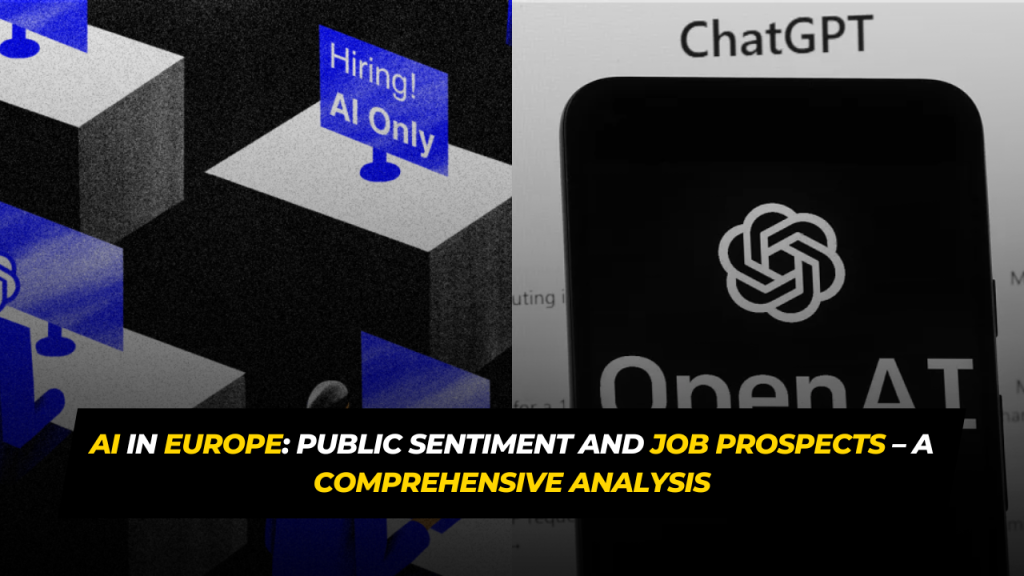AI in Europe: Public Sentiment and Job Prospects – A Comprehensive Analysis
In recent years, the advancement of artificial intelligence (AI) has raised concerns across Europe, particularly when it comes to its potential impact on job security. With the introduction of transformative AI technologies like ChatGPT, many Europeans are now calling for government regulations to safeguard their livelihoods. In this article, we’ll explore the evolving sentiments surrounding AI in Europe, the rising demand for regulations, and a surprising twist in the story of AI and job prospects in Spain.
The Call for AI Regulations in Europe
A recent study conducted by Spain’s IE University sheds light on the increasing demand for AI regulations across the European continent. Out of a sample of 3,000 Europeans, a staggering 68% expressed their desire for government-imposed rules to mitigate the impact of automation brought about by AI. This marks an 18% increase from a similar study conducted in 2022, where 58% of respondents supported AI regulation.
The primary concern driving this call for regulations is the fear of job loss. Ikhlaq Sidhu, the dean of the IE School of SciTech, points out that this concern is shared by the majority of Europeans. Estonia is the only exception, with a 23% decrease in the number of people advocating for AI regulation. In Estonia, only 35% of the population wishes for government-imposed restrictions on AI.
The shift in public sentiment towards AI regulation is largely attributed to the widespread adoption of generative AI products, such as ChatGPT, which has underscored the potential for job displacement.
Global Efforts for AI Regulation
Governments worldwide are acknowledging the need for AI regulation. In the European Union, the AI Act is set to introduce a risk-based approach to govern AI, addressing different levels of risk associated with various AI applications. The United Kingdom is also taking steps, with Prime Minister Rishi Sunak planning to hold an AI safety summit, positioning the UK as the “geographical home” for AI safety regulation.
AI’s Impact on Job Prospects: A Surprising Turn of Events in Spain
Amidst the concerns about AI’s impact on jobs, a study undertaken by the Bank of Spain has challenged some assumptions about AI’s influence on the Spanish job market. Contrary to widespread fears of job losses, the study, which analyzed the impact of AI on employment in 15 Eurozone countries, including Spain, found that AI has not led to widespread job losses. In fact, employment has increased in occupations exposed to AI, and there is no concrete statistical evidence to suggest that wages are negatively affected by technology.
Spain, in particular, has demonstrated a positive relationship between AI-enabled automation and employment changes. The report concludes, “We find a positive association between AI-enabled automation and changes in employment shares in the pooled sample.”
The New Landscape of Job Risk
Recent studies have shed light on the types of jobs most at risk due to AI advancements. While manual labor was once considered the most vulnerable, the emergence of tools like ChatGPT has raised concerns about jobs in media, academia, and creative industries. Occupations like mathematicians, translators, journalists, legal secretaries, managers, accountants, financial analysts, and more are now seen as being at risk. Conversely, manual labor positions remain less likely to be replaced by AI.
Age and Job Prospects
The Banco de España report also noted a correlation between the age of employees and the likelihood of AI-induced job losses. Jobs that typically employ younger workers are less likely to be displaced by AI, emphasizing a more favorable outlook for these occupations.
In conclusion, Europe is experiencing a shifting landscape in terms of AI regulation and job prospects. Public sentiment is increasingly in favor of regulations, driven by the fear of job displacement. However, Spain’s unique experience challenges some assumptions about AI’s impact on employment, showing that AI can lead to job growth rather than job loss. This nuanced view of AI’s influence on jobs calls for a closer examination of the factors contributing to job security in the age of artificial intelligence.

